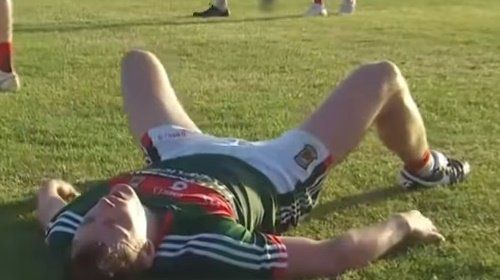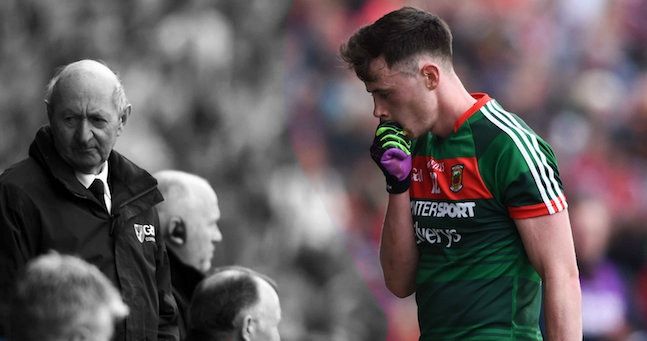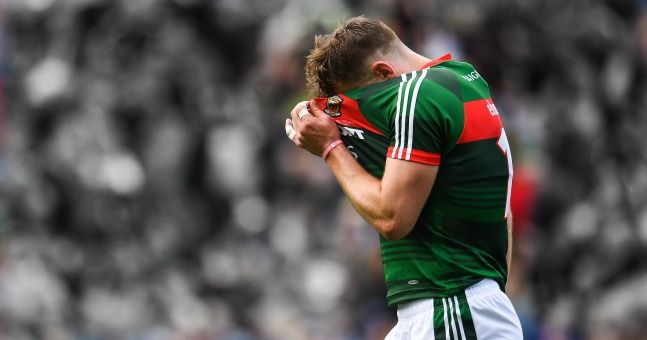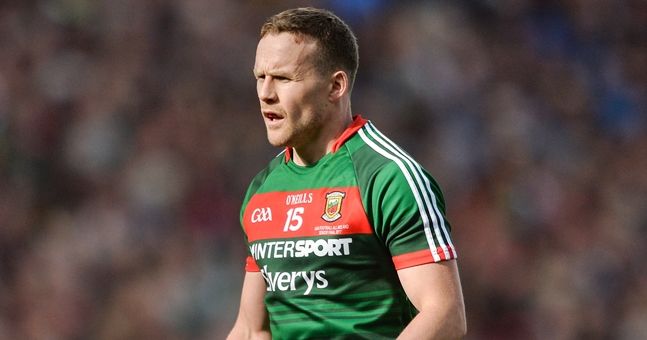There was a moment on Saturday night when the story of Mayo – The Great Struggle as it will come to be known – took human form.
It was just minutes after both of Diarmuid O’Connor’s legs cramped simultaneously. When, realising that the physio stretching just one of them wasn’t going to cut it, he literally dragged himself from the pitch so Andy Moran could kick a free.
His hamstrings seizing, his face planted into the earth with the shock, O’Connor used his hands and his hands alone to get out of the way and let the battle go on.
But not even that could’ve done this story justice.
It was after that, when he was back on again, back bursting through tackles, winning dirty ball and literally bouncing all over the plains of St. Conleth’s Park.
He rushed toward the sideline and grasped a loose size five in his clutches for all his worth and hung on for dear life as one, two and three Kildare jerseys closed in and hammered the shite out of him. Shoulders, legs, hands were crashing off O’Connor’s body as he stumbled from one hit to the next, refusing to surrender possession until he was eventually brought to his knees once more and offered mercy by the referee.
Diarmuid lay strewn on his back, beaten and bruised. Even after so many lethal blows, even after coming through all of them, this was the worst of them. He looked to be struggling for breath, probably consciousness too, as he stared into the sky having no clue if his efforts would even be worth it after all that.
In truth, he looked absolutely fucked.

His time was up, you thought. No more.
You couldn’t keep going, you couldn’t want to.
The famous story goes about Diarmuid O’Connor that he once covered 16km in one game for Mayo. Impressive as it is but, for him, that’s 16km of constant acceleration, of tracking runs, of breaking tackles and taking poundings in the middle of the field for the cause. One man’s 16km isn’t the same as it is for O’Connor. It’s 16km of hell.
So you witnessed someone who had literally run himself to a standstill in midfield and not one sinner would’ve begrudged him for finally succumbing to the relentlessness of that hell. Every time he picks himself up, he’s cut back down – there’s only so much one person can take.
Then, he opens eyes, he takes one deeper exhale, he makes one decisive bang of his hands, and, somehow, the same man makes his way to his feet once more.
Mayo men always find their way back to their feet.

So O’Connor goes into the breach again. He runs harder and he hits back and, when all is said and done, Mayo lose.
Mayo lose.
With minutes remaining, a point between the sides, the Ballintubber man hurls his body on top of a loose ball in the Mayo area but he’s punished because it touches the ground after he’s caught it as he rolls along the turf looking for an inch somewhere. 70 minutes of pure guts and balls and sweat, 70 more minutes of hell amount to nothing because Mayo lose.
O’Connor picking himself from the ground, taking hits square on the chin and still moving forward gets no reward, no mercy. The plug is pulled, the summer is over and there’s nothing any of them can do about it anymore but try to get back to their feet in another year.

But after failing to reach the All-Ireland semi-finals for the first time since 2010, the narrative in the fallout of that Round 3 loss is that we have reached the end of the road for Mayo. We’ve reached a point where the players just could not be arsed picking themselves back off the floor.
The near-misses, the heartbreak, they’ve been used as reasons for why it would be just too hard to get back now.
The miles on the clock, the age-profile, they’re the big ones that are honed in on when the story goes that this team simply ran out of time.
And, of course, with the obvious decline in performance-standard this year, there was enough to go writing the eulogy of one of the most captivating tales in Irish sports history.
Wrote this last September about what the @MayoGAA footballers have done for the county. It goes way beyond winning a trophy. It's beautiful https://t.co/Hl1uBYAkPC
— Conán Doherty (@ConanDoherty) June 30, 2018
There are three different ways you can look at it though:
- Injuries
- Age
- Relativity
It’s been no secret that, over the last number of years as Mayo flirted with greatness, they haven’t been blessed with a talent pool of the same kind of depth as Dublin. They don’t have a Cormac Costello or a Bernard Brogan or a bloody Diarmuid Connolly to bring off the bench. They do, however, have 15 to 17 players good enough.
This year, they were plagued though. Cillian O’Connor started off injured. Chris Barrett just about made it back. Keith Higgins was hurling for most of the year and then, come Saturday night in Newbridge, they were operating without four of the men who started last year’s All-Ireland final: Brendan Harrison, Donal Vaughan, Tom Parsons and Seamus O’Shea.
To stay at the same level they’ve been at and to do it by going man on man against every team – especially Dublin – Mayo can’t afford to have their side ripped apart like that. The replacements they have outside of their core, the subs they’re then left with just aren’t good enough.
So that’s also used to spell the end because if the county lose the service of some of the guys they’re being touted to lose, then there’s no coming back.
David Clarke, Ger Cafferkey, Keith Higgins, Barry Moran, Andy Moran – all eyes are on them but, being completely blunt, their absences won’t destroy Stephen Rochford’s plans.
Andy Moran, yes, would be a big blow but, even at 34, it’s doubtful if he’d want to pack it in given his individual form.
Barry Moran hasn’t been an impact on the team for some time now whilst full back Get Cafferkey has struggled with enough forwards that it’s clear he wouldn’t make the 15 with everyone available.
Keith Higgins has been used more and more as a spare man whilst David Clarke, for all the service he has given Mayo, for the unbelievable shot-stopping abilities he possesses, he is not irreplaceable.
Kicking is now the most important thing for a goalkeeper in Gaelic football and Clarke admits himself that it has been an area of his game he has had to work on. The absence of Seamus O’Shea and Tom Parsons probably showed that more against Kildare when he was hitting up contested balls and they weren’t being gobbled up by green jerseys as much as normal.
The goalkeeper position has changed. Donegal brought in Shaun Patton out of nowhere – he was playing with Sligo Rovers in the League of Ireland, off the radar for any previous managers in the hills and, suddenly, they’ve unearthed one of the finest passers in the country who is obviously a good shot-stopper too. Micheál Schlingermann – another former Sligo Rovers ‘keeper – is out of contract and he’s lying around the county with a deadly right foot and Kiltimagh blood. These guys are out there.
Throwing together a list of names of fellas in their 30s is a bit of scaremongering and irrelevant enough when you consider Andy Moran won Footballer of the Year at 33 and was contested by his goalkeeper of the same age.
The team that started the 2017 All-Ireland final also, today, has an average age of 29.3. And only three of them are above 31 right now (and one’s a goalkeeper).
Mayo 2017 final starters’ age (birthday month in brackets)
David Clarke: 34 (November)
Brendan Harrison: 25 (October)
Keith Higgins: 33 (February)
Chris Barrett: 31 (April)
Lee Keegan: 28 (October)
Colm Boyle: 31 (July)
Paddy Durcan: 23 (September)
Seamus O’Shea: 31 (March)
Tom Parsons: 30 (February)
Donal Vaughan: 29 (December)
Aidan O’Shea: 28 (June)
Kevin McLoughlin: 29 (May)
Jason Doherty: 28 (November)
Cillian O’Connor: 26 (May)
Andy Moran: 34 (November)
That’s 15 players culminating in an average of 29. Only two outfielders in Keith Higgins and Andy Moran are really pushing on and one is still enjoying the form of his career.
Then, you consider two of the subs that day who have been impressing so far and can be used realistically in an All-Ireland tilt.
Conor Loftus: 22 (July)
Diarmuid O’Connor: 22 (July)
The mercurial Shane Nally still has clamours for his inclusion in the team but whether it’s a lack of pace, a definite position or whatever else, Rochford must have reservations for some reason. Any time he’s played though, he’s impressed.
Shane Nally: 27 (October)
And two young lads who made their championship debuts this summer and showed some promise have loads of time.
Eoin O’Donoghue: 21 (July)
James Durcan: 23 (September)
They have another team in an under-20 semi-final this season but they’re not deliberately overlooking players of the same standard as David Clifford and Sean O’Shea. They’re working with what’s best.

At the end of it all, the only thing that really matters is that everything is relative.
Mayo’s ability is judged only as far as everyone else’s and, whatever happens this winter, Mayo come back automatically as a team at the very least in the top five in the country.
It’s doubtful that anyone else is capable of beating Dublin at present but it’s also doubtful that Mayo have really fallen that far behind anyone but maybe Kerry. They don’t have the squad to cope with injuries and, listen, they might not have the tools to ever beat this Dublin in a final but writing them off completely isn’t just overlooking basic facts that their players are far from over the hill or that they just happened to be particularly unlucky this year, it’s also vastly overestimating the rest of the country who’d all need one hell of a jump to make it to the same level and to have enough teams to consistently keep Mayo out of the Super 8s. It couldn’t happen and it won’t.
In 2018, they’re off nearly three full months sooner than they have been in the last seven years. It could be the best thing that ever happened to them – they’ll be chomping at the bit come January and there’ll be no hurt or regret lingering freshly.
Listen, it doesn’t mean they can go on and win the whole thing. But they can certainly lift themselves off the ground again and go give it another rattle.
What would Diarmuid O’Connor do?











































